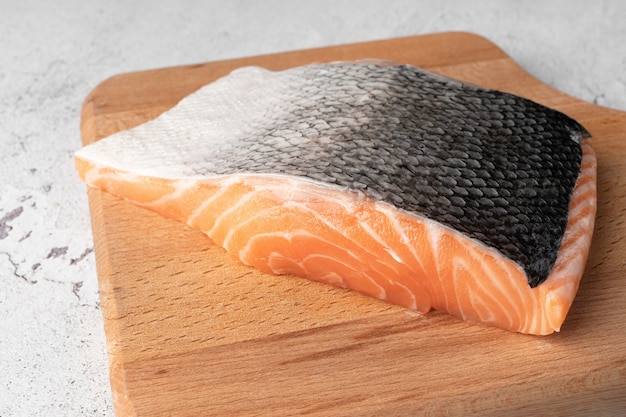Although salmon is frequently hailed as a nutrient-dense food, seafood enthusiasts are still divided on one issue: is it possible to eat salmon skin? Some diners are devoted to its crispy texture and nutrient-rich profile, while others remove it without hesitation. However, is salmon skin genuinely safe and does it have any health advantages? Let’s examine the opinions of experts in science and cooking.
Salmon skin is a versatile delicacy that can be found in many different cuisines. From crispy pan-seared fillets to salmon skin chips that resemble bacon, it gives any dish depth, crunch, and an omega-3 boost. Whether it’s roasted into a crunchy snack or wrapped around sushi rolls, this sometimes-overlooked portion of fish could be the key component your diet needs.
Benefits of Eating Salmon Skin for Nutrition
Proteins, vital vitamins, and good fats are all abundant in salmon skin. It is a nutritional treasure trove with advantages ranging from heart health to brain function due to its high concentration of omega-3 fatty acids.
| Nutrient | Health Benefits |
|---|---|
| Omega-3 Fatty Acids | Supports brain health, reduces inflammation, and lowers heart disease risk. |
| Protein | Essential for muscle growth, tissue repair, and immune function. |
| Vitamin D | Helps in calcium absorption and strengthens bones. |
| Collagen | Improves skin elasticity, joint health, and wound healing. |
| Antioxidants | Protects against oxidative stress and promotes healthy aging. |
How to Properly Consume Salmon Skin
Salmon skin can give your food a crispy, savory bite if it’s prepared properly. The best ways to enjoy it are as follows:
- Pan-seared for the highest level of crunch
To achieve a golden, crispy crust that retains moisture, cook the salmon skin side down in a hot pan.
- Prepare Chips with Salmon Skin
When salmon skin is roasted, air-fried, or deep-fried, it becomes a crunchy, flavorful snack that resembles potato chips in texture.
- Include It in Stir-Fries and Soups
Crispy salmon skin enhances stir-fried vegetable dishes, ramen, and broths with a deep umami flavor.
- Savor the Sushi
Crispy salmon skin, which adds a savory crunch to rice and soy sauce, is a common ingredient in sushi rolls.
The Health Advantages of Consuming Salmon Skin
- Promotes Heart Health
Omega-3 fatty acids, which are abundant in salmon skin, have been shown to support heart health, lower bad cholesterol, and reduce inflammation.
- Enhances Cognitive Abilities
Omega-3 fatty acids are essential for memory, cognitive function, and lowering the risk of Alzheimer’s disease.
- Promotes the Health of Skin and Hair
Salmon skin, which is high in collagen and essential fatty acids, promotes hair strength, hydration, and skin elasticity.
- Promotes Joint and Bone Health
Collagen and vitamin D combine to strengthen bones and increase joint suppleness.
- Promotes Muscle Recuperation
Salmon skin’s high protein content promotes muscle growth and repair, making it a fantastic complement to an active lifestyle.
Does Eating Salmon Skin Pose Any Risks?
Although salmon skin is very nutrient-dense and safe, there are a few things to keep in mind:
- Wild versus Farmed Salmon
Higher concentrations of pollutants, such as heavy metals and PCBs (polychlorinated biphenyls), may be present in farmed salmon.
Solution: To reduce exposure to pollutants, choose salmon that is wild-caught from pristine, well-regulated waters.
- Possible Interactions with Drugs
Because omega-3 fatty acids thin the blood, they may conflict with blood thinners.
Solution: Before consuming a lot of foods high in omega-3 fatty acids, speak with your doctor if you take anticoagulants.
- Additional Fat-Based Calories
Salmon skin adds extra calories to your diet because it has more fat than the flesh.
Solution: As part of a balanced diet, enjoy salmon skin in moderation if you’re watching your calorie intake.
Is Salmon Skin Safe to Eat?
Yes, salmon skin is tasty and nourishing if it is prepared properly and sourced ethically. It is a great addition to your meals because of its rich flavor, crunchy texture, and health-promoting qualities. Salmon skin is an underappreciated superfood that should be on your plate, whether it is pan-seared, roasted, or added to sushi.
The skin of salmon is crispy and full of nutrients, so don’t throw it away the next time you cook it.


